New Federal Guidelines for Radiation Exposure Compensation
The United States is revisiting its approach to compensating individuals affected by radiation exposure, following the introduction of updated guidelines from the Department of Justice for the Radiation Exposure Compensation Act (RECA). This comes after RECA’s revival in a recent legislative package passed in July.
Initially set to expire in 2024, RECA has been extended, bringing hope to many, especially in the Navajo Nation. Tribal officials emphasize the potential benefits for thousands of members who worked as uranium miners and those known as downwinders.
Navajo Nation Council Delegate Amber Kanazbah Crotty remarked, “The passage of RECA was meaningful step forward, but we still need a long-term extension that reflects the lived experiences of Navajo families impacted by decades of uranium mining.” She urged those affected to file claims promptly, before the Dec. 31, 2027 deadline.
The renewed program broadens eligibility, now including uranium miners active until the end of 1990. It also introduces benefits for core drillers and remediation workers for the first time, increases compensation to $100,000, and covers more kidney diseases among miners.
Additionally, eligibility now extends to certain areas of Mohave County and sites linked to the Manhattan Project’s nuclear waste processing in Missouri, Tennessee, Alaska, and Kentucky.
First enacted in 1990 and amended a decade later, RECA aims to compensate individuals affected by nuclear weapons test fallout. Many across the western U.S. suffer from cancers and severe health issues attributed to test detonations in Nevada and New Mexico, as well as uranium mining and processing activities.
—
Read More Arizona News









